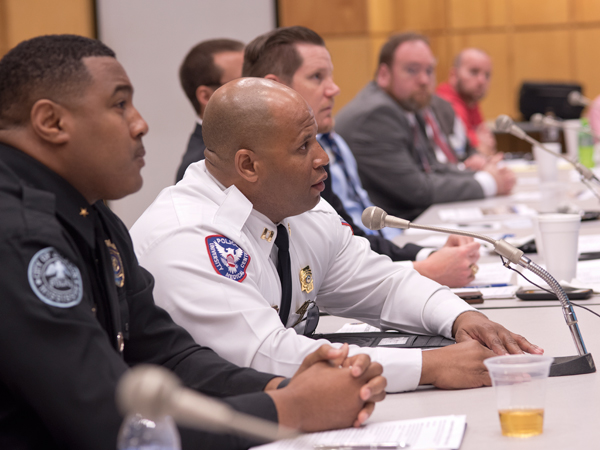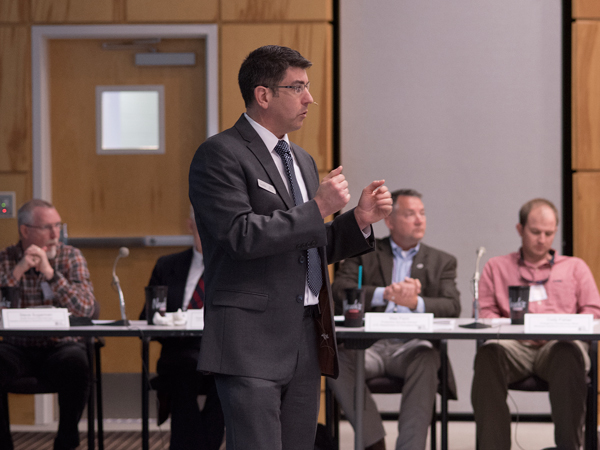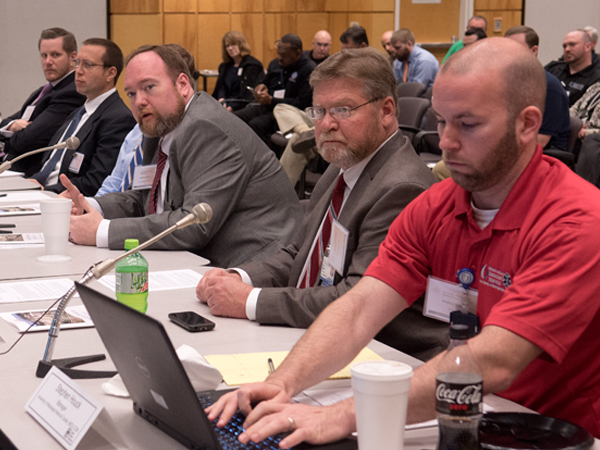Exercise helps agencies coordinate thunderous response to WMD threats

Two armed assailants gain access to hazardous materials and take multiple hostages. Hackers break into the institution's website and its social media accounts become compromised. A "dirty bomb" explodes.
How would emergency responders, police and executive leaders work with local, state and federal agencies to initiate the appropriate response to such nightmarish scenarios?
That was the focus of "Magnolia Thunder," a terrorist weapons of mass destruction tabletop exercise hosted by UMMC, the Federal Bureau of Investigation and the Department of Energy's National Nuclear Security Administration Wednesday. Representatives from approximately 50 organizations, including the Department of Justice, the Department of Defense and the Department of Homeland Security, came to the Norman C. Nelson Student Union to take part in the exercise, a challenging fictional scenario that pushed the boundaries of their domestic terror response capabilities.
According to Holly Vaughn, an exercise planner with Summit Exercises and Training in Washington, D.C. and one of the tabletop moderators, the activity provides an opportunity for responders to discuss how they might best work together to mitigate the consequences of a terrorist incident.
"We think it's really important to give these agencies the opportunity to exchange information and clarify their roles and responsibilities during the exercise," Vaughn said. "Everyone's well informed on international and national levels, but when you bring this kind of 'what if' scenario locally to this kind of facility, it spurs thoughts of what might be done to respond."

As the daylong exercise continued, the scope and intensity of the threats increased. Ultimately, a coordinated, multifaceted direct attack on the institution was revealed, ratcheting up the pressure on law enforcement, first responders, government officials and executive leaders to coordinate the most appropriate actions.
According to Jason Smith, UMMC's manager of emergency services, the sheer size and magnitude of the services offered by the Medical Center could make it an attractive target for potential terrorist activity.
"We remain in contact with all of these federal and state agencies and partner with them in regular day-to-day operations as well as emergency management," Smith said. "We know we can't handle every event on our own, which is why this tabletop exercise is so important.
"It allows us the collaboration and training opportunities to prepare for a terrorist event with the same individuals who will be here for other kinds of emergencies, such as natural disasters."
Delaine Stacy, interim director of the Mississippi Office of Homeland Security's Mississippi Analysis and Information Center, said the exercise helps hone coordinating agencies' response skills.
"This kind of tabletop exercise helps people think, plan and become better prepared to handle these complex incidents and events that are going to happen in today's world," Stacy said. "This training helps participants open up their imaginations to what could happen and where it could take place.
"It's important because, as agencies evolve, they get new coordinators and supervisors, people retire, transfer, and that institutional knowledge often leaves with them. You can't put a value on these relationships, knowing the people (at these agencies), knowing who to call."

Smith said the scripted exercise heightened joint situational awareness of each agency's capabilities.
"Every agency has its own way of doing things," he said. "It's invaluable to have a tabletop exercise to learn what resources and training we need to provide to them and they need to provide to us. Having the opportunity to understand what the expectations are for each other is so important to developing a successful pre-disaster strategy.
"Another agency may have developed some valuable resource or capability since the last time we attended a tabletop, or they may have discovered a better method of doing things. This exercise allows you to share each other's capabilities and resources, as well their experience and expertise."
Ann Heinrich, deputy director of the NNSA's Office of Office of Nuclear Incident Policy and Cooperative in Washington, D.C., said she was impressed by the quality of the responses and the depth of knowledge displayed by the representatives taking part in the exercise.
"It was evident from my perspective that all of these people know each other and were comfortable discussing their policies and procedures," said Henrich, whose office conducts approximately 8-10 such exercises throughout the country each year. "Everybody was relaxed and I was impressed with their ease of communication - it speaks highly of their training and ability to work together.
"I think everyone has a clear understanding of their roles, responsibilities and plans - and how their roles integrate together."
Although not a competition, the tabletop exercise did reveal some real winners - the citizens of Mississippi who live near and work at UMMC, each of whom may one day come to depend upon those gathered for the Magnolia Thunder scenario.
"When a major event happens (in Mississippi), the Medical Center is an integral part of the health-care response," Stacy said. "It's extremely important that they were included in and hosted this exercise today."


